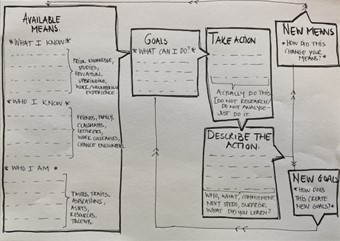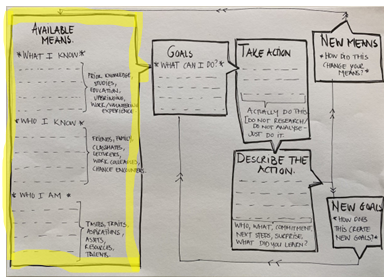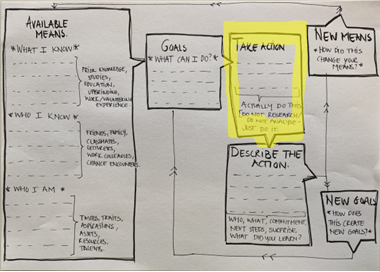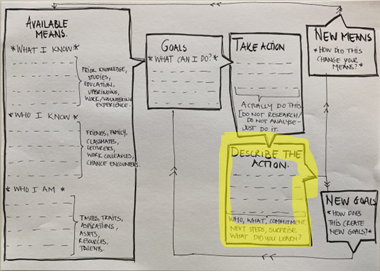In this topic, we will revisit the effectuation process now that you have a good understanding of the individual components. The effectuation process puts together all the key principles that we have learned about throughout the previous topics.
Welcome to Topic 11: YOU as an effectual entrepreneur. In this topic, you will learn:
- About the entrepreneur in you
- How it all comes together: the effectuation process
- About who you are, who you know and what you know: your available means
- How to put this together in your effectual learning plan.
These relate to the Subject Learning Outcomes:
- Recognise the sobering statistic of business failures, while understanding the learning value of such experiences.
- Recognise the sobering statistic of business failures, while understanding the learning value of such experiences.
- Identify and apply the core principles of effectuation and how they form the basis of the effectual cycle.
- Identify the different types of uncertainty as put forward by economist Frank Knight and the implications for entrepreneurs.
- Explain the entrepreneurial bias toward action leads to experience, which in turn increases self-efficacy.
Welcome to your pre-seminar learning tasks for this week. Please ensure you complete these prior to attending your scheduled seminar with your lecturer.
Click on each of the following headings to read more about what is required for each of your pre-seminar learning tasks.
There is no specific chapter reading for this topic. Instead, you will use the prescribed textbook to revisit key principles and case studies that were important to your personal entrepreneurial learning in order to create your effectual learning plan (assessment 3). Throughout the topic however, there will be sections of the text for you to read (or revisit).
- To start with go back through the prescribed textbook and find two (2) case studies that inspired you. These could be examples of ventures that you would be proud of starting, or they could be examples of entrepreneurs who taught you something about yourself and your vision of the future.
- Note the cases down in your journal and explain briefly why you have selected each of these cases (in other words what do they mean to you)?
This task will help you complete part 1 of your effectual learning plan where you need to think about who inspires you.
No doubt at some point during this topic where we put everything together you will get a little stuck. At whatever point that happens for you, I want you to jump onto the discussion forum and put up a post to ask for help. Think of the class as your brains trust, that you can tap into to help co-create outcomes with.
Refer to Topic 11: Forum Activity 1 for further instructions.
You can also navigate to the forum by clicking on ‘ENT101 Subject Forum' in the navigation bar for this subject.
To get you started on this topic and important aspect is the reflection on what has been most important to your personal learning.
Refer to Topic 11: Forum Activity 2 for further instructions.
Read and watch the following content.
In this final topic, we are going to bring everything together. You will collate the work you've done in relation to your own available means, affordable loss and any reflections that relate to you as an entrepreneur and you will bring this together in your effectual learning plan.
The entrepreneur in you
To remind ourselves that there is no one type of entrepreneur, start off by watching the following video in which Sarasvathy explains that everyone can be and entrepreneur or learn how to be entrepreneurial. Pay attention to what she says about your chances of success being linked to learning how to navigate failure. This is the first major component that you will need to build into your personal effectuation learning plan.
How can you better navigate failure?
We know that failure represents important opportunities for us to learn in the effectual process. Refer to your earlier reflections and take a moment to think about how you can better navigate failure.
Note these ideas down as part of your third assessment draft, in the first part of your effectual learning plan.
How it all comes together: the effectuation process
As part of the first topic, you were introduced to the effectuation process, and we looked at the effectuation three pager. Take
a moment to revisit the three pager and check your understanding of the key principles and how these fit together.
Society for Effectual Action, 2011, ‘What is effectuation?’ Society for Effectual Action
An important characteristic of the effectual process is the iterative nature of the cycle. It is a continual cycle of trial and error which results in building your available means in responses to the actions you undertake (Society for Effectual Action 2011; Read et al 2016).
To bring this to life, watch the following video. As you will be developing your effectual learning plan, reflect on what this might look like for you.
Who you are, what you know and who you know: your available means
Effectuation always starts with your available means. This is where you use what you have in order to take a first immediate step. If your starting point is based on who you are and what makes you unique, and this is the basic building block of the venture you start to create, it makes us think of actions that we may otherwise overlook (Read et al 2016).
In the following video, Ernest Higa, best known for bringing Domino's to Japan, provides some advice for future entrepreneurs. Being able to navigate and bridge the gap between American and Japanese markets Is a key strength in Higa’s available means. This is a clear starting point for Higa in establishing many of his ventures.
For a different perspective on this, watch the following video in which Sarasvathy talks to Daymond John. He provides some tips on how to get started if you want to become and entrepreneur. Pay attention to how the three tips he provides are, in fact, a different way of describing how to act from what you have and grow your available means. This video might help you think about your own available means inventory in the next section.
Read et al (2016) suggests a couple of ways to help you set out an inventory of your available means:
- By using your resume as a tool to map out your available means. Rather than thinking about it in terms of listing your different work experiences and your role there, look across your resume and think about what available means you acquired across the work listings on there.
- By asking your friends or family to describe your available means.
Refer to chapter 10 of the prescribed textbook for more tips on mapping out your available means.
How to put this together in your effectual learning plan
The following diagram is the basis of your effectual learning plan. It is adapted from the effectual cycle developed by Read et al (2016) and allows you to put what you have learnt across the topics into action. This requires you to put effectuation into practice.

The steps below will guide you through the process of completing the template diagram. Document each step as this is part of your third assessment submission.
Step 1 – Thorough inventory of your available means.
Set out a complete inventory of your available means, listing what you know, who you know and who you are in the first section of the effectual learning plan. Refer to the highlighted section of the diagram below. You can use information from learning tasks completed in previous topics to help you put this together.

Step 2 – Formulate goals
The second step is to set out your goals. Refer to the highlighted section of the diagram below. As we have seen in the available means game these can be quite ambiguous. Remember the difference between a causal and effectual approach here. There needs to be enough flexibility to shape these goals.
We know that an important differentiation between a causal and effectual approach is that goals set by effectual entrepreneurs are means-driven. In other words, you set out goals based on your available means (Read et al 2016 pg 113). These goals start off being less specific as they are shaped though trial and error and the interactions with others (co-creation).

Step 3 – Take action
This should be based on your available means. It is experiential learning – this is where you actually do something. This can be a very simple small step – that you do not research or analyse anything further for. It is simply a starting point... Refer to the highlighted section of the diagram below.

Step 4 – Describe the action you took
This is an account of how the action went - who was involved, how did it go, were there any surprises, what did you learn? Set this out in the highlighted section of the diagram below.

Wrap-up
There is no one type of entrepreneur. Effectuation sees learning how to reframe or navigate failure as an important aspect to success. It is this trial-and-error mindset that enables entrepreneurs to go through the iterative nature of the effectuation process; continuously adding to their available means and adapting their goals based on learning from their actions.
In this topic you have stepped through the various components of your effectual learning plan and started to take action and grow your entrepreneurial skill set.
Key takeouts
- Everyone can learn how to be entrepreneurial. Learning how to navigate failure is an important indication of your chance of success as an entrepreneur.
- The effectual process is iterative which results in building your available means in responses to the actions you undertake.
- If your starting point is based within your available means and who we are, who you know and what you know forms the main building block of any venture you set out to create, it leads you to take actions that we may otherwise overlook.
- Taking action is a critical part of the effectual learning plan. It is by ultimately by taking action and interacting with others that we learn through our experiences. By doing this we add to our means and revise our goals.
Welcome to your seminar for this topic. Your lecturer will start a video stream during your scheduled class time. You can access your scheduled class by clicking on ‘Live Sessions’ found within your navigation bar and locating the relevant day/class or by clicking on the following link and then clicking ‘Join’ to enter the class.
Click here to access your seminar.
The learning tasks are listed below. These will be completed during the seminar with your lecturer. Should you be unable to attend, you will be able to watch the recording, which can be found via the following link or by navigating to the class through ‘Live Sessions’ via your navigation bar.
Click here to access the recording. (Please note: this will be available shortly after the live session has ended.)

In-seminar learning tasks
The in-seminar learning tasks identified below will be completed during the scheduled seminar. Your lecturer will guide you through these tasks.
For this task we are going to get a bit creative. There are three scenarios for which you will be given a brief description of a person's available means. Then you’ll be provided with a sentence that sets out the person’s goals in a quite ambiguous way.
- It is up to you to create an idea for a venture that:
- uses the available means set out in the following table.
- is aimed at making money (so think about what the market might look like)
- and is aligned with the person’s goals (or vision).
- Create a brief narrative to describe what this person might be doing based on the available means and the vision provided to you. There are no right or wrong answers, try to generate as many ideas as you can within your allocated teams and be prepared to share these with the rest of the class.
| Available means | Goals |
|---|---|
| Created the first and largest internet service provider in Kosovo in the months after the Balkan conflict ended. This person worked in West Africa to set up computer systems that helped reunite refugee children with their families. | I want to use technology to deliver better, more affordable and more widely available healthcare. |
| Independent businessperson. This person ran their own digital photography company for over a decade, when the service became commodity due to the wide-spread access to digital photography on personal devices. Background in engineering with a bachelor's degree in mechanical engineering and a master’s in Engineering Management. University lecturer in Beirut, Lebanon. | I want to better prepare engineering graduates for the real world and get my 7-year-old son away from video games. |
| With a background in waste management, this person spent eight years consulting to the United States waste conglomerate. Won an award for creating the Best Environmental Website. This person has experience in marketing strategy, sales and advertising for Shell Oil, Exxon, Goodyear and Coca-Cola. Bachelor's degree in economics and government. | If the annual waste generated by the United States was put into garbage trucks, the convoy needed to carry it all would circle the earth more than 600 times. I need to help solve this. |
Welcome to your post-seminar learning tasks for this week. Please ensure you complete these after attending your scheduled seminar with your lecturer. Your lecturer will advise you if any of these are to be completed during your consultation session. Click on each of the following headings to read more about the requirements for each of your post-seminar learning tasks.
If you have any final questions for your lecturer about the third assessment, send these to your lecturer to discuss during the Q&A session as part of the consultation session.
Each week you will have a consultation session, which will be facilitated by your lecturer. You can join in and work with your peers on activities relating to this subject. These session times and activities will be communicated to you by your lecturer each week. Your lecturer will start a video stream during your scheduled class time. You can access your scheduled class by clicking on ‘Live Sessions’ found within your navigation bar and locating the relevant day/class or by clicking on the following link and then clicking 'Join' to enter the class.
Click here to access your consultation session.
Should you be unable to attend, you will be able to watch the recording, which can be found via the following link or by navigating to the class through ‘Live Sessions’ via your navigation bar.
Click here to access the recording. (Please note: this will be available shortly after the live session has ended.)

These are optional readings to deepen your understanding of the topic material:
- August, S.B 2017, Effectuation – Saras Sarasvathy | Intangibles 008, IntangiblesPodcast, https://www.intangiblespodcast.com/effectuation-saras-sarasvathy/li>
- Chicago Booth Review 2016, How to start-up: Don’t fall in love with your idea, streaming video, You Tube, https://www.youtube.com/watch?v=ax6d1uVZ33w&t=60s
- Society for Effectual Action n.d., Effectuation 101, Society for Effectual Action, https://effectuation.org/effectuation-101
References
- Big Think, 2012, The entrepreneur in us all, streaming video, You Tube, https://youtu.be/784b8ERvzoU /li>
- Read, S, Sarasvathy, S, Dew, N & Wiltbank, R 2016, Effectual Entrepreneurship, 2nd ed., Routledge.
- Shipton C, 2016, A brief guide to Effectuation, streaming video, You Tube, https://www.youtube.com/watch?v=oC-yWrC0P_E&t=66s
- Society for Effectual Action, 2011, ‘What is effectuation?’ Society for Effectual Action, https://22657557.fs1.hubspotusercontent-na1.net/hubfs/22657557/Public%20Documents%20For%20Site/effectuation-3-pager.pdf
- Society for Effectual Action 2020, Start with things within your reach – Daymond John, streaming video, You Tube, https://www.youtube.com/watch?v=Tat-eW-X3Xg&t=10s
- Society for Effectual Action, 2020, Ernest Higa – advice for future entrepreneurs, streaming video, You Tube, https://youtu.be/A-LgQM5KwjI
